Interview: David Lindsay-Abaire On Adapting His Play Rabbit Hole
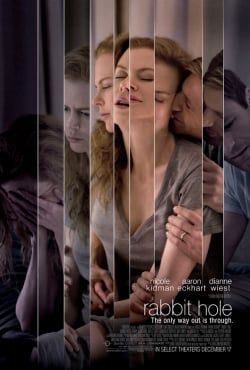
David Lindsay-Abaire's career as a playwright had been marked by absurdist comedies like Fuddy Meers until he responded to advice to write about the thing that scared him most. A new father, Lindsay-Abaire penned Rabbit Hole, about a couple coping with the accidental death of their four-year-old son. The subject matter is grueling, but Rabbit Hole is suffused with Lindsay-Abaire's comedic wit and pitch-perfect sense of how humans relate to each other through sarcasm and jokes even in their most despairing moments. Rabbit Hole won the 2007 Tony Award and Pulitzer Prize for drama, but even following all that success, Lindsay-Abaire hadn't thought about turning it into a movie until he was approached by, of all people, Nicole Kidman.
Kidman spent four years securing the funding for the film, which hits theaters this week directed by another New York theater veteran, John Cameron Mitchell, best known for directing and starring in the rock musical Hedwig and the Angry Inch. Mitchell's participation is just one of many unexpected things about Rabbit Hole, from its biting humor to Kidman playing a woman raised in a working-class background to the fact that, for once, it was a writing process for Lindsay-Abaire that wasn't somehow torturous. While he's still at work writing major would-be Hollywood blockbusters-- you can read what he told me about his work on Sam Raimi's Oz: Great and Powerful here-- Lindsay-Abaire said working on Rabbit Hole was the first time he's written a screenplay that actually resembled what made it onto the screen.
In the movie Kidman and Aaron Eckhart play the central couple, coping with the loss of their four-year-old son Danny even as Kidman's character Becca's sister Izzy (Tammy Blanchard) is learning she's pregnant. Dianne Wiest also stars as Becca's mother, still coping with the death of her son many years earlier, and Miles Teller plays the teenager who accidentally hit Danny in his car. Becca reaches out to the teenage boy in cryptic ways at first, while Eckhart's character Howie strikes up a friendship with a woman (Sandra Oh) in his bereaved parents support group.
Read below for my extensive interview with the playwright and screenwriter, about the process of building Rabbit Hole as a movie, the changes he had to make from his original play, his nightmare idea of what the movie could have been, and why it's still just as funny as the play was. Rabbit Hole opens in limited release this weekend.
You've done a lot of writing for Hollywood to supplement your playwright income, and from what I can tell, you haven't had much control over the what actually made it to the screen, especially as compared to Rabbit Hole.
When you do a studio picture it starts off, everybody agrees on the movie that you're going to write. It's good for a little while, but my experience has been you do a first draft and then you start getting notes. You get notes from 9 different people, and every one of those 9 different people are making a different movie in their head. Then you're trying to address their notes. Then you do a second draft, and now you have 15 people with notes, and they've making 15 different movies in their head. When people giving notes don't agree with each other, the story becomes confusing and watered down, and all sorts of awful things can happen with a studio movie. That doesn't always happen, but that has been my experience. Writing those sorts of things became less and less exciting to me.
For Rabbit Hole, when i was approached by Per Saari, who's Nicole's producer, and Nicole, they said "We love this play, do you think there's a movie in it?" I said, "I think there could be a movie in it."
CINEMABLEND NEWSLETTER
Your Daily Blend of Entertainment News
Had you thought about it before?
No, I honestly hadn't. I said, here's how I think I would open it up, and a lot of things i said ended up in the movie. But I said, "I really have no interest in turning it into something that it isn't." They assured me that they wanted me to be part of the process every step of the way. I felt like that was the movie we had all agreed on, and when it was finished, I still felt that way.
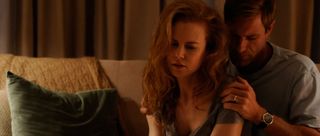
Did you have the nightmare version of the movie in your head, with the violin music and the big sweeping cameras and all the melodrama?
No question. The tone is so delicate, so easy to mess up. Of course I was terrified of it. When I sat down with John, John understood the script implicitly, and understood the tone, and had no interest in turning it into the sentimental movie of the week, which it could so easily be. He understood the humor in it, which is so important to the tone of the story. Every step of the way, it was still the movie that I imagined it to be, and it never lost its way, because this miracle thing happened where everybody involved understood the movie we were making and made that movie.
And it wasn't a huge transition from the play.
It was exactly as I imagined it. And better! Of course everyone contributed things that had nothing to do with me, but it was truthful and organic to the story, and therefore right.
You've got other scripts developing at studios. Does your experience on Rabbit Hole give you more faith in the process?
I don't know. I just have to accept the process for what it is. I guess I don't expect this to happen if I'm writing a studio movie. I love doing movies, and it pays my mortgage to do a studio movie, and the two movies I'm working on right now have been terrific and respectful, but there are still a lot of people involved. It could easily go in a different direction. What was great about Rabbit Hole is it was a small group of people, and no crazy notes. It was just a different environment and it's rare. Most of those movies don't end up getting filmed. If you get really smart people with a nice small story, where do you get the money? Nicole worked four years trying to raise the money for this movie. And she did it, but it took the starpower of Nicole Kidman to make this happen.
She made this happen, but the character of Becca comes from this working class background, while Nicole has this very patrician air, being so tall and striking. It's a contrast with the character and I wondered if you had to wrap your head around that.
No, not at all, if only because the character has so reinvented herself, has worked so hard to redefine herself from her family. She is clearly the golden girl who has gotten out of a chaotic family situation. This is a character who somehow got out of that environment and got to a great school and got an amazing job and married the perfect guy and got the perfect house and chose to leave her professional career at the moment she chose to start a family. Yes, she comes from a working class background-- so do I . I know this world incredibly well.
Is that why you wanted to include that contrast between the classes, because you're so familiar with it?
I didn't go into Rabbit Hole wanting to write about class. I think because of who I am it somehow found its way into it. My new play is very much about class. I just wrote about what I knew. Sometimes it was conscious, sometimes it wasn't. I knew I wanted to write a story about loss and people grieving in different ways. When I started meeting her family I thought, oh, I want there to be some friction in this family, and how do I help the tension and the conflict. What if they are different in other ways, not just that the mother lost a son? What if they really have trouble communicating because they're different in other ways? This woman is educated, her mother is maybe less educated. It just added an interesting spice to the stew, I guess.
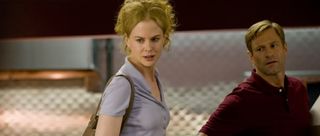
You said you wrote this because it was the thing you feared most, losing a child. When you adapted this for the screenplay, did you have to dredge all those fears back up? Or did you not go quite as deep because you had done the hard work already?
Adapting it became much more of a technical exercise than an emotional one. When I wrote it my son was probably 4, and that actually was really useful to me a a writer, because I had access to all those emotions and fears. I didn't lose any of that in the adaptation, I still had access to that, but it was like, "I know what that is, because I've spent four years…" It was less difficult to write the adaptation than to write the original play.
And where did those decisions get made about what to expand and what to cut? For example, Izzy is slightly less present in the movie.
The Izzy character was much bigger in the original screenplay. Something that I couldn't predict as a writer was that the balance of what the story was was out of whack. It was, "this is a movie about two sisters" for the first 20 minutes, because she's so present and it's so much about her pregnancy. We didn't shoot this, but even in the very first draft we saw the bar scene where Izzy gets into a fight. I just love that character so much. If we're going to make it sharper and leaner and about this woman's journey, then the sister is important and integral, but we can lose a lot of that stuff.
Was it hard to kill your darlings in that process?
I was pretty ruthless in the adaptation, only because I really wanted to reinvent it, and if it didn't work for the screenplay, I got rid of it. There were vestiges of things that i knew killed--particularly funny stuff.
The thing that I initially missed was, because Izzy's character was cut so much, she had a lot of the comedy, especially at the beginning of the movie. I thought, "I want the audience to know it's OK to laugh.". It wasn't until I got to Toronto and saw the movie put together, and there was laughter throughout. I had to remember, oh right, there's all the new stuff that I added that I had never seen in front of an audience, that got all the laughs. We didn't lose any of the humor at all.
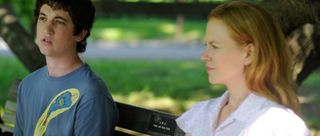
A huge change is Becca going after the boy who drove the car that killed her son, almost stalking him. This obsession isn't really in the play.
It's in the play, it's just different. In the play he reaches out to her. But I wanted to activate her character more, and make it more cinematic. The moment where she sees him in the bus, it's useful for a bunch of reasons. One, it builds up some expectations in the audience, mystery: "Who is this kid? Why is she chasing him?" I don't think she knows why she's semi-stalking him, but underneath it is this desperate need to connect with someone, and particularly that boy, and I don't think she knows why until the end. I don't think she knows it other than, there were only three people at that event, and one of them is dead, and one of them is in that bus. You see all of her maternal instincts coming out. She's always taking care of that boy, even though he's a stranger. All of those things make us see, oh right, she was a mom, and we knew what kind of mom she was, but also what kind of mom she could have been.
Having gotten through this, adapting your own work, do you think it's made you better at screenwriting?
I don't know yet. I guess it's too soon. I know i enjoyed it better than any screenplay, but I had such ownership over it to begin with that it made me feel more in control. And I knew the material better than anyone. Sometimes I would disagree with notes, and they would turn out to be terrific notes. With studio work I'm always the bottom man on the totem pole. But also I like the give people the benefit of the doubt. If I've been hired to write something, I don't know the material, and I'm discovering it with these people who may not be very smart. It's a completely different process, and it's way more difficult.
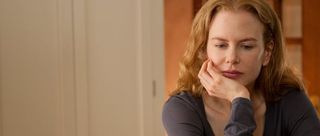
Staff Writer at CinemaBlend
Most Popular






